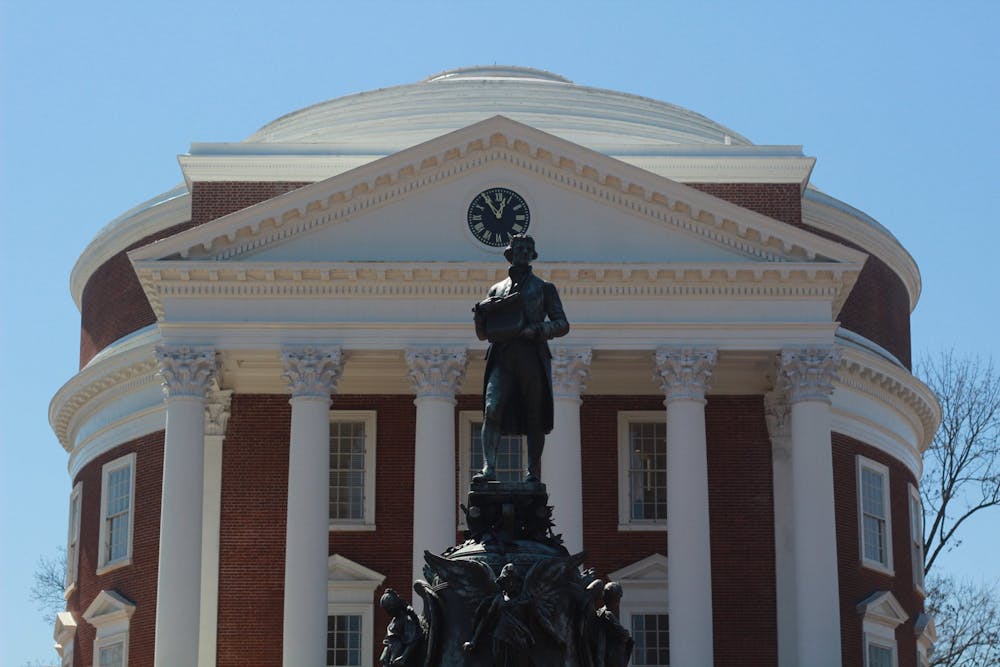As a student at the University — an institution famous for its connections to some of America’s most notable founding fathers — I often feel as if I am walking amongst history as I cross Grounds each day. As I pass by the statue of Thomas Jefferson, so nobly positioned in front of the Rotunda, I cannot help but feel a great sense of awe at this man who has come to represent the core values of the nation he helped to create — for better or for worse. I add this last clause to the sentence because as I have continued to learn more about the legacy of one of the most prominent figures in our nation’s history, I have come to realize that my vision of a man who spent his life advocating for freedom, equality and independence for all is incorrect and damaging. In our culture, Jefferson has come to be a symbol of the freedoms we hold so dear. He is a character almost mythological in nature — but upon further examination, the man does not live up to the myth.
Each year in history classes throughout the United States, students are taught about the legacy of the foundation of America and its architects — Thomas Jefferson chief among them. We are taught that Jefferson spent his life fighting tirelessly for the words which he himself set down — “We hold these truths to be self-evident, that all men are created equal, that they are endowed by their Creator with certain unalienable Rights, that among these are Life, Liberty and the Pursuit of Happiness.” And it cannot be denied that Jefferson believed these words at least to an extent — after all, he frequently wrote about the evils of slavery. The trouble, however, comes in the hypocrisy he exhibited by ignoring his own moral standards whenever it served his purposes to do so.
Jefferson displayed remarkable double-mindedness by simultaneously condemning slavery and participating in it. Perhaps the best summary of his peculiar ethos is a quote by author Javier Merizalde — “Sometimes a man cannot live up to the best idea he dared to have.” Jefferson was a man possessed by revolutionary ideas, yet he lacked the moral tenacity to translate them into a reality. This mortal flaw cannot be overlooked, and has led to an increased villainization of Jefferson in recent history, as researchers have begun to shed antiquated historical biases and preconceptions in pursuit of truth. I do not argue that it is not deserved, only that it is not the complete picture.
At this point, we are faced with a choice. Do we continue to praise Jefferson as a champion of modern thinking or condemn him as a racist and a hypocrite? This dilemma carries an especially large weight for students at the University, who — as beneficiaries of Jefferson’s philosophies and actions — may attach much significance to his image. I would argue that this question is not as simple as it seems. I propose that we utilize a special lens through which to examine Jefferson’s life — one which allows for much more nuance than a simple verdict of exaltation or condemnation.
It cannot be denied that Jefferson, despite all his flaws, was a man who made unfathomably important contributions both to our University and our nation. His influence on the University can still be seen clearly to this day, not only in the physical structures he envisioned and commissioned, but in the spirit of the University’s academics and atmosphere. My proposition is this — we evaluate Jefferson not as a myth, but as a man. We recognize his unforgivable flaws and empathize with those oppressed by his legacy as a slaveowner, while also understanding that we would not be here today without his grand ideas of freedom and independence.
As a society, we must cease to elevate our leaders and revolutionaries on a pedestal. As we have seen time and time again throughout history, if someone suffering from the human condition is held to a standard of perfection, they will always fall short. We must learn to utilize nuance in our evaluations of all people, whether they be historical leaders or current ones. As for Jefferson, we can do this by praising him for his remarkable philosophies and immeasurable contributions to our University, while deriding his inability to live up to his own proposed ideals. We must neither worship nor tear down the statue of Thomas Jefferson residing in front of the Rotunda. We must look upon him not as a myth of good or evil, but as a deeply flawed man who possessed the brilliance to propel both our University and our nation forward into an age of morality which he could not, himself, embody.
Thomas Laughridge is an Opinion Columnist for The Cavalier Daily. He can be reached at opinion@cavalierdaily.com.
The opinions expressed in this column are not necessarily those of The Cavalier Daily. Columns represent the views of the authors alone.







